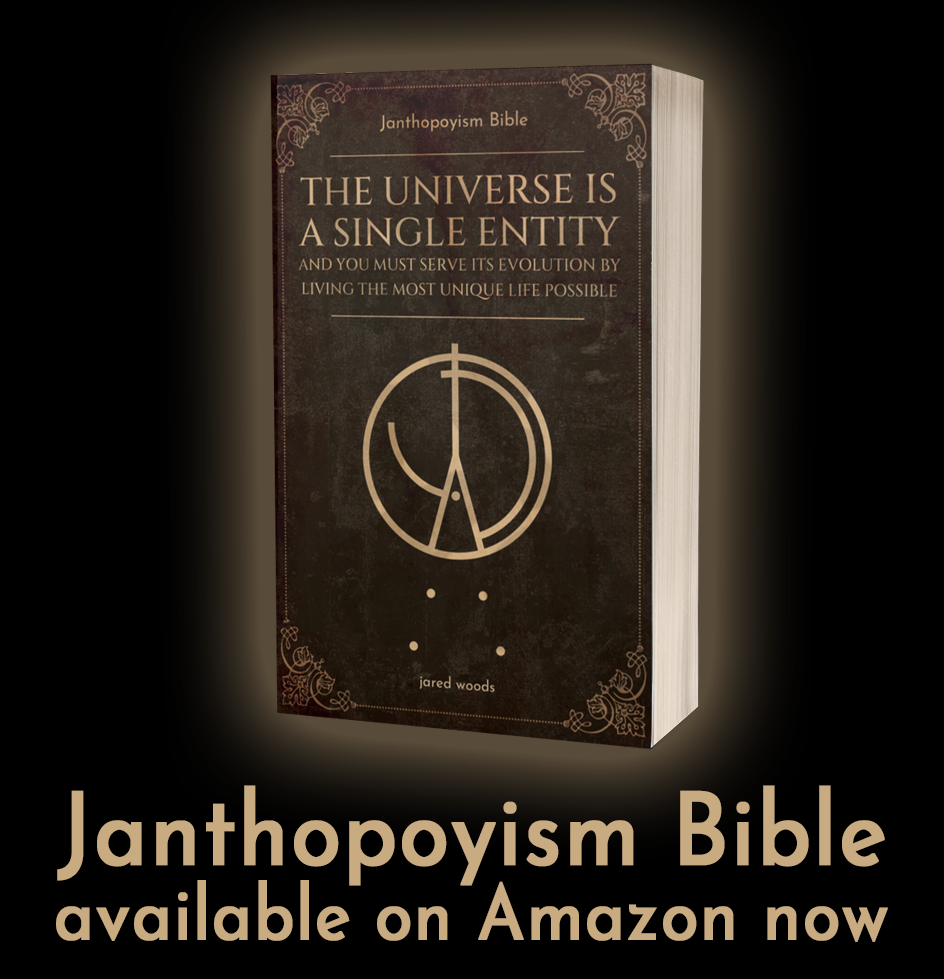

Janthopoyism
Book Review: Elements of Pantheism by Paul A. Harrison
Misc Scripture | 26 April 2020When I first came across the Pantheism title, my vibrations nearly exploded through the chair I was sitting on. For reasons of arrogancy I'm sure, I thought my general philosophy on spiritualism was wholly unique and yet here was an ideology that ticked all of my fundamental boxes. It is the outlook that "God" is merely the energy and manifestation of the universe while a "higher power" was as simple as the collection of literally everything. This works as the only logical bridge between science and spirituality, an umbrella understanding of which I felt every belief system could hold hands underneath, the bare minimum of inarguable concepts so tragically unexplored by the majority of thought.
That said, it was amusing to me that books on the topic existed. Pantheism is akin to a mathematical formula, in a way, or riding a bike, in another. Once it clicks, it clicks on a profound level. There's no further education or elaboration required. It is a simple core belief that you either understand or do not. However, as I developed Janthopoyism (my own branch of Pantheism)), I realised it may be best for me to cover my bases and examine what other authors had been saying in this realm. And now you're up to date as to why I purchased this publication and we can proceed together.
First up, I am happy to report that Elements of Pantheism justifies its existence. It does a great job of detailing the history of the movement by dotting it out on the timeline of more famous religions from both the Eastern and Western strings of perception, working like a nifty (but brief) crash course on most other faiths. I was also interested to note that people have been killed for their Pantheistic theories before, that's harsh. Through information such as this, I was able to unlock various other paths to trawl through in my own time and I did collect new terminology to describe my stances better. For example, omniverse is a yummy word! Or that Pantheism could be argued as "religious" in a sense due to a profound spiritual connection we feel for the universal energy as a whole. Is that different from how others view everything? I've never really thought about that before. So, for the most part, I read the book like, yeah, totally.
But not always. Not always often. One major disagreement I have with author Paul Harrison is how he seems to be quite aversive against other religions whereas I accept everything as a part of our little planet's place in the greater evolution. His wording is carefully selected to not offend other groups whilst using scripture verses and historical knowledge to boast his impressive education. But, in doing so, he does come across like someone who considers himself the authority on the subject. Furthermore, let's be honest, anyone who quotes scripture to relay their point is dodgy at best, because you can find whatever you want within those texts. And when Paul says the Universe doesn’t have a mind? And when Paul says there’s no level after death? I mean, sure, man, maybe. Personally, I could believe that. But show me evidence or you're letting your own opinions muddle an idea which is not yours to determine.
My concerns fall even deeper when Harrison draws major comparisons from Pantheism to atheism. In fact, the back cover quotes Richard Dawkins who famously labelled Pantheism as "sexed-up atheism". I try to be open to all beliefs (or lack thereof) but I find myself biting my tongue closest to blood when it comes to the A-word. I understand that "God" has been compartmentalised (and often bastardised) by the Abrahamic religions (Judaism, Christianity, Islam) but for atheists to argue with this one specific definition only perpetuates the problem. God is a concept which predates organised religion. Don't get stuck! And yet, nobody is more stuck than atheists. Even strict religions continuously evolve with new interpretations and denominations of their initial viewpoints. Atheism has crossed out the entire existence of something and stopped there forever. This has caused a big problem for me because while I see God in everything, I now have to be cautious with my use of the word simply because atheists can't handle it. The very utterance of these three-letters sends them into a malfunctioning frenzy and they switch off. You have to sugarcoat the understanding of God with terms like "universal energy" or "life" or "nature" just to get through to them and that sucks. Atheists are why we can't have nice things.
And this leads to my deepest issue with Paul Harrison, deeper than all of my issues combined. As the founder of the World Pantheist Movement and a staunch environmentalist, his own agendas seep through every page's pore. He's too certain in many of his reports with a heavy push for nature conservation, selling it as a part of the Pantheistic ethos to the point of sounding far more Pagan than he lets on. Certainly, I wholeheartedly agree with him on a personal moral level, but I do not believe this is necessarily a Pantheistic criterion. Someone who disrespects nature can still have Pantheisitc conclusions about the universe. For what is unnatural anyway? Are humans not part of nature? Could nature be evolving as self-destructive energy? Of course it could! Hence why it irks me that he's claimed the Pantheism name under his own analysis. Even the idea of a Pantheistic organisation in itself is uncomfortable. Is this book a sneaky promotional tool? And then when he provides a list of sacred dates for the "religion" I'm like... wait a minute, just who do you think you are??
Still, it would be unfair for me to claim that Dr Harrison has been completely biased here, for he does recognise the plethora of thought paths available (albeit fleetingly). He's done well to appeal to all spiritual beliefs without ever saying what you must or must not do, as this would be counterproductive to someone attempting to sway global consciousness. And, by the end, my own conclusions had been represented by casual mentions at least. In fact, some pretty advanced notions that I thought I'd invented were included here and I was like, ok, damn, maybe I'm not so brilliant after all.
Which is what I am most grateful for. It's that this book helped to place me in the exact spiritual point that I love. It's the one of exciting uncertainty, armed with more questions to electrocute between my neurological sparks. My deepest belief remains as one of fierce agnosticism and I begin to wonder where certain explorations may still lead me. Am I actually what's known as a Panentheist who believes there could be another level of God above the universal one? Do I believe in animism where all atoms could contain a soul? Or panpsychism where every atom has some form of consciousness? Hell, even monotheism and/or polytheism make sense to me because if you wish to personify the universe to better communicate with (and therefore manipulate) the laws of science using thought then that's the ultimate power! So what do I believe?? WHAT AM I???
Hence why I have delightedly concluded that there is more than enough space (or perhaps even a need) for Janthopyism amongst the crowded arena of spiritual philosophies. Pantheism is not going to click with everyone and so if you vibe with anything I said above, then I urge you to sign up to my newsletter. Together, we can unlock the mysteries of the cosmos! I know a lot of people have claimed this before, but I'm super cereal, you guys.
In regards to the book itself, it's probably best read by non-Pantheists seeking some understanding of the movement. If you're already pantheistic then you've most likely come to your own conclusions and this will feel a touch offkey.
Janthopoyism is a spiritual philosophy meets self-improvement program.
We view the Absolute collection of all Universal Energy to be the highest power. You are part of that power. You are an extension of divinity.
The ultimate purpose of this power is to evolve, and we each have a unique part to play in this progression. The details of your role are relayed to you every moment of your life via emotional notifications.
The tricky bit is that human beings have developed a communication barrier between themselves and this instruction.
This barrier is called "the brain".
But never fear! By utilising some very simple practices, you can open the flow of exchange, granting you access to the ether of infinite ideas, the infallible path of your guided destiny, and the recollection of your holiness.
Which is basically a wanky way of saying that your life is about to get a whole bunch better.
Join the movement before it becomes too mainstream.
We view the Absolute collection of all Universal Energy to be the highest power. You are part of that power. You are an extension of divinity.
The ultimate purpose of this power is to evolve, and we each have a unique part to play in this progression. The details of your role are relayed to you every moment of your life via emotional notifications.
The tricky bit is that human beings have developed a communication barrier between themselves and this instruction.
This barrier is called "the brain".
But never fear! By utilising some very simple practices, you can open the flow of exchange, granting you access to the ether of infinite ideas, the infallible path of your guided destiny, and the recollection of your holiness.
Which is basically a wanky way of saying that your life is about to get a whole bunch better.
Join the movement before it becomes too mainstream.





